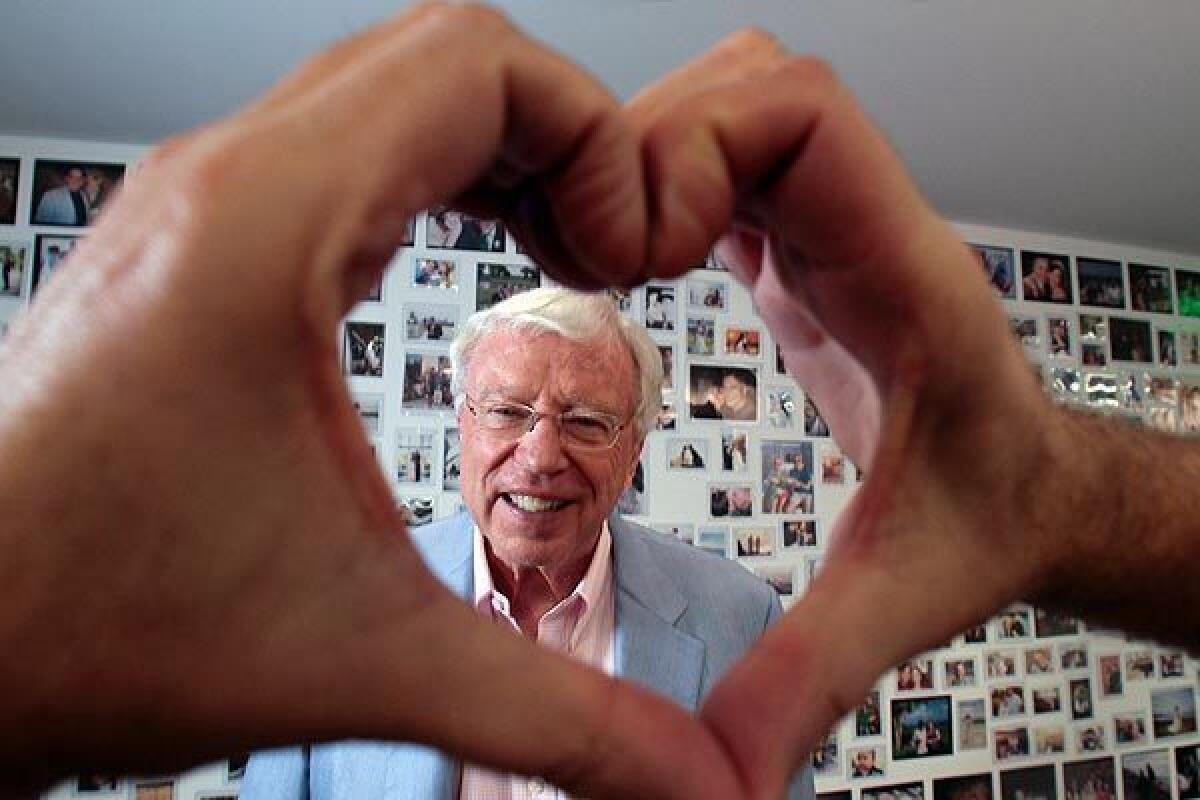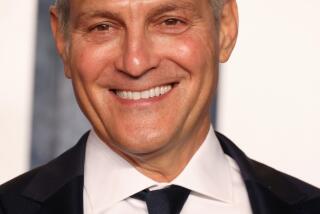EHarmony founder has his heart set on reviving the dating site

Neil Clark Warren thinks he’s the best match for EHarmony Inc.
In a move that caused his friends to call him crazy, the 78-year-old EHarmony founder came out of retirement in July to become chief executive, looking to resuscitate one of the most recognized online dating services that was struggling amid increased competition.
“We’d gotten a bit lost,” Warren said recently at the company’s Santa Monica headquarters, decorated with hundreds of photos of couples who met on the website. “Things were going backward, and we weren’t doing nearly as well as we were doing before.”
In the last three years, he said, new memberships, retention rates and time spent on the site were all down. The company’s most recent CEO, former Zynga Inc. executive Jeremy Verba, left after just a year because of strategic differences with the board of directors, of which Warren has always been chairman.
Now in the top job for the first time, Warren has been doling out some tough love at the company he created in 2000. He quickly uprooted the top management team, naming a new chief financial officer, chief technology officer, chief operating officer and head of public relations.
Quiz: The year in business, 2012
He closed some of the company’s unprofitable international operations, switched advertising firms and whittled down the nine-member board to just himself and one other director. Through a combination of layoffs and voluntary departures, the company went from 260 employees a year ago to 160 today. Now, just 15% of EHarmony’s staff has been with the company at least five years.
But Warren’s biggest move might be his goal of expanding EHarmony’s brand to include more than just online matchmaking. He wants to make EHarmony a broad “relationship site” that includes services to help users make new friends, find the right job, become better parents, cope with aging and solve interpersonal problems, among others.
It’s an ambitious and far-reaching plan, but one that will differentiate the company in an increasingly crowded online dating market, in which big-name established sites such as EHarmony, Match and OkCupid are competing with smaller upstart websites and apps.
EHarmony, which began as a site primarily for Christian singles, is now one of the most-recognized online dating brands in the $2-billion-a-year U.S. dating services industry. It says an average of 542 people marry nationwide every day as a result of being matched on the site.
But it holds only a 13.6% share of the market, according to a September report by research firm IBISWorld. Market leader InterActiveCorp, which owns numerous dating sites including Match and OkCupid, holds a 23.7% share.
And EHarmony’s growth has slowed: Its 2012 revenue is estimated at $275 million, up 3.8% from last year. That’s down from 2008, when EHarmony saw 16.4% year-over-year growth, IBISWorld said.
By rolling out seven or eight new concepts over the next few years, EHarmony hopes to leverage its brand to new members and to the 44 million registered users it has had since launching 12 years ago. The company plans to offer different subscription options, including bundled packages, for new services.
“We built a brand that was way too big for one revenue stream,” Warren said. “I think we could have had a very good business forever matching people for marriage. But our sense was, we could do a lot more than that.”
Analysts said it’s a logical next step for a company that has amassed a virtual treasure trove of data over the years.
“We have the buzz word of big data, and that lends itself to all sorts of different things. As you mine that data, you might uncover various things that could create another business,” said Kerry Rice, senior Internet and digital media analyst at Needham & Co. “I think that’s a fair strategy.”
How EHarmony manages that wealth of member information — users fill out an extensive questionnaire when they join the site, answering questions about their daily habits, likes and dislikes, past experiences and goals — will be the key to whether the new ventures are successful, said Mark Brooks, an online dating industry consultant.
“I’ve seen a few Internet dating companies moving into other areas and failing,” Brooks said. “But in the case of EHarmony it makes a lot of sense because they have deeper information on their users than any other company I can think of.”
Still, Brooks said he doesn’t want EHarmony to lose focus on its core business, which “no question should have been a half-a-billion-a-year-revenue company by now.”
It’s a criticism Warren doesn’t dispute. EHarmony has been comparing his CEO appointment as similar to when Steve Jobs returned to Apple Inc. in the 1990s, and is hoping that a tighter relationship between the company and its founder helps it get back on track.
Already, EHarmony has seen its business stabilize and shown growth in some key areas, executives said.
The privately held company declined to release financial details but said new memberships increased 20% in the last month from the month before. It also said a member’s average total amount spent on the site is up 15% year over year (membership costs vary but are generally $60 monthly or about $250 annually, among the highest in the industry).
“We have a good trajectory coming up,” said Armen Avedissian, EHarmony’s new chief operating officer. “We’ve got over 1.2 million people who have been married using the EHarmony services. We’re going to try to expand it into other industries and see how far that takes us.”
For Warren, who worked as a clinical psychologist, relationship expert and author before founding EHarmony with his son-in-law, holding a big corporate job has been an unexpected turn of events.
He and his wife of 53 years, Marylyn, moved from a spacious home in Maine to a two-bedroom apartment in Santa Monica. He takes a cab to work and puts in 12-hour days. He jokes that he must be one of the oldest CEOs in the country but says he plans to keep this up for five years before retiring for good.
It’s a grueling schedule, but one Warren said he felt compelled to take on as the company moves beyond online dating.
“I wasn’t sure there was a right person besides me,” he said. “Nobody has as much absolute passion for this issue, I think, as I do.”
More to Read
Inside the business of entertainment
The Wide Shot brings you news, analysis and insights on everything from streaming wars to production — and what it all means for the future.
You may occasionally receive promotional content from the Los Angeles Times.










